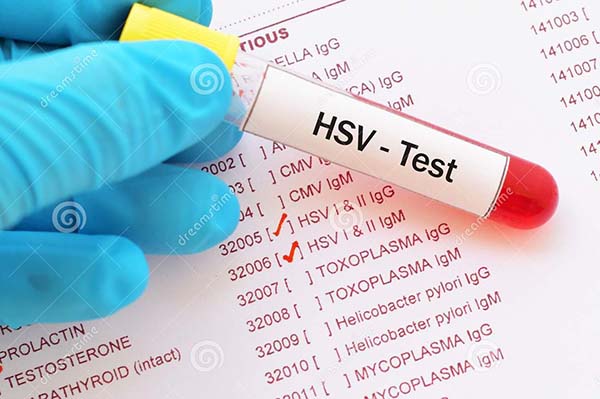Herpes Tests
There are different tests available for herpes. Viral culture and DNA tests can be done if you are experiencing symptoms. Blood tests are available for people who may not have had symptoms or if the signs have already healed.

Testing with symptoms
If symptoms of herpes appear, they can vary widely from person to person. If a person does experience signs of infection, we recommend obtaining a culture test (a swab from the symptom) within the first 48 hours after a lesion appears. Results are usually available in about a week's time.
Testing with no symptoms
Blood tests can be used when a person has no visible symptoms but has concerns about having herpes. Blood tests do not actually detect the virus; instead, they look for antibodies (the body’s immune response) in the blood.
IgM vs. IgG
When an individual contracts herpes, the immune system responds by developing antibodies to fight the virus: IgG and IgM. Blood tests can look for and detect these antibodies, as the virus itself is not in blood. IgG appears soon after infection and stays in the blood for life. IgM is actually the first antibody that appears after infection, but it may disappear thereafter.

IgM tests are not recommended because of three serious problems:
- Many assume that if a test discovers IgM, they have recently acquired herpes. However, research shows that IgM can reappear in blood tests in up to a third of people during recurrences, while it will be negative in up to half of persons who recently acquired herpes but have culture-document first episodes. Therefore, IgM tests can lead to deceptive test results, as well as false assumptions about how and when a person actually acquired HSV. For this reason, we do not recommend using blood tests as a way to determine how long a person has had herpes. Unfortunately, most people who are diagnosed will not be able to determine how long they have had the infection.
- In addition, IgM tests cannot accurately distinguish between HSV-1 and HSV-2 antibodies, and thus very easily provide a false positive result for HSV-2. This is important in that most of the adult population in the U.S. already has antibodies to HSV-1, the primary cause of oral herpes. A person who only has HSV-1 may receive a false positive for HSV-2.
- IgM tests sometimes cross-react with other viruses in the same family, such as varicella zoster virus (VZV) which causes chickenpox or cytomegalovirus (CMV) which causes mono, meaning that positive results may be misleading.
The accurate herpes blood tests detect IgG antibodies. Unlike IgM, IgG antibodies can be accurately broken down to either HSV-1 or HSV-2. A recent study corroborates this finding: labs that used non-gG-based tests for herpes had high false-positive rates for HSV-2 antibodies (14-88% saying the blood sample was positive for HSV-2) in samples that were actually only positive for HSV-1 antibodies. But 100% of the labs using gG-based tests accurately reported that the blood sample was negative for HSV-2.
The challenge here is that the time it takes for IgG antibodies to reach detectable levels can vary from person to person. For one person, it could take just a few weeks, while it could ta ke a few months for another. So even with the accurate tests, a person could receive a false negative if the test is taken too soon after contracting the virus. For the most accurate test result, it is recommended to wait 12 – 16 weeks from the last possible date of exposure before getting an accurate, type-specific blood test in order to allow enough time for antibodies to reach detectable levels.
There are currently several FDA-approved, gG-based blood tests that can give accurate results for herpes. Like any blood test, these tests cannot determine whether the site of infection is oral or genital. However, since most cases of genital herpes are caused by HSV-2, a positive result for type-2 antibodies most likely indicates genital herpes.
Have herpes & feel alone? Meet nearby people with herpes

PositiveSingles is one of the most popular dating websites for people suffering from herpes and other STD. It was initiated in 2001. With 1,510,800+ members you are sure to find lots of potentail people around you.
Join and meet nearby people with herpes, browse profiles and chat now!
How accurate are blood test for herpes?
Many people have questions about how accurate herpes blood tests are. The truth is that herpes blood tests work reasonably well, but no test is perfect. That's one reason doctors may be reluctant to test for herpes. They worry about balancing the patient's desire to know with the potential emotional damage caused by a positive herpes blood test result. Due to the stigma associated with herpes, that worry can be in place whether the result is true or false.
Herpes blood tests are actually pretty accurate.That's particularly true for the type-specific tests that are most often recommended! In a relatively high prevalence population, they give accurate results the vast majority of the time. It's worth noting, though, that if my prevalence estimates were off, it would make a big difference. What if we worked from the assumption that only 10% of the population was infected with either virus? Then although almost all negative tests would still be accurate, positive tests would only be correct 55% to 85% of the time. In other words, there would be a lot of false positive tests.
Why doesn't CDC recommend testing everyone for Herpes Test
CDC does not recommend herpes testing for people without symptoms. This is because diagnosing genital herpes in someone without symptoms has not shown any change in their sexual behavior (e.g., wearing a condom or not having sex) nor has it stopped the virus from spreading. Also, false positive test results (test results that say you have herpes when you do not actually have the virus) are possible.
Although CDC does not recommend that everyone get tested for herpes, herpes testing may be useful.
Have herpes & feel alone? Meet nearby people with herpes

PositiveSingles is one of the most popular dating websites for people suffering from herpes and other STD. It was initiated in 2001. With 1,510,800+ members you are sure to find lots of potentail people around you.
Join and meet nearby people with herpes, browse profiles and chat now!
Know more facts about living and dating with herpes:
- How to have a fulfilling sex life with herpes
- What is your chance of spreading herpes?
- Fear transmission? Try herpes dating sites
- How to handle dating when you have herpes
- How to tell your partner you have herpes
- Overcome the stigma of herpes
- Herpes and getting pregnant: How to protect your baby
- Herpes and HIV
- Do condoms prevent herpes? How likely is it to get herpes with a condom?
